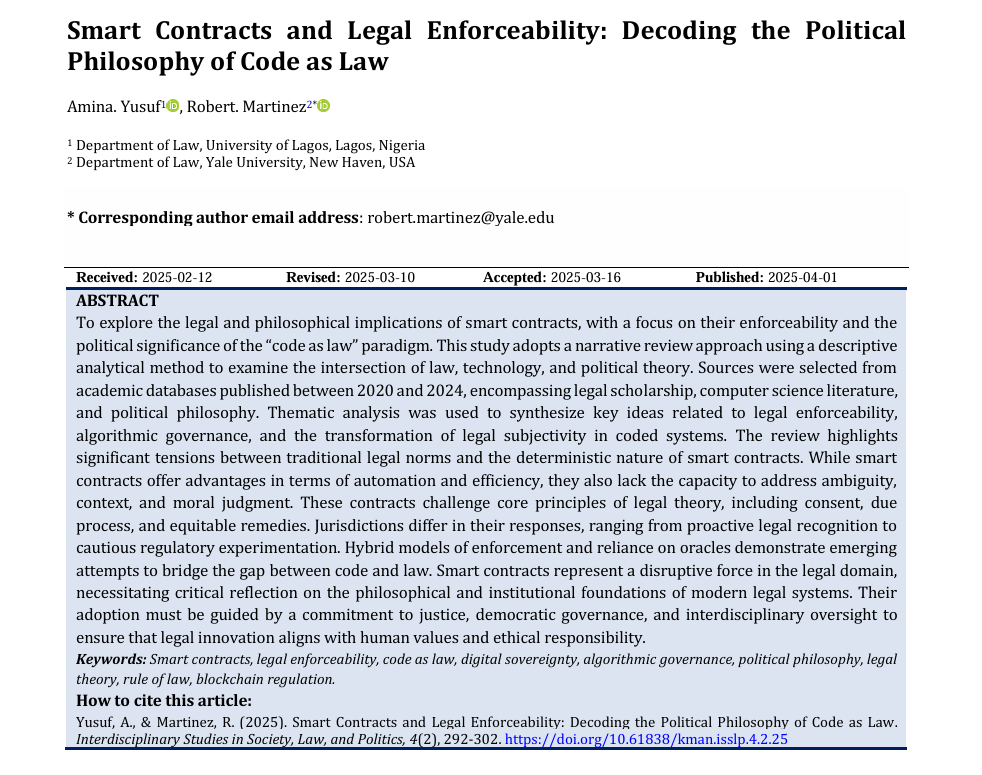Smart Contracts and Legal Enforceability: Decoding the Political Philosophy of Code as Law
Keywords:
Smart contracts, legal enforceability, code as law, digital sovereignty, algorithmic governance, political philosophy, legal theory, rule of law, blockchain regulationAbstract
To explore the legal and philosophical implications of smart contracts, with a focus on their enforceability and the political significance of the “code as law” paradigm. This study adopts a narrative review approach using a descriptive analytical method to examine the intersection of law, technology, and political theory. Sources were selected from academic databases published between 2020 and 2024, encompassing legal scholarship, computer science literature, and political philosophy. Thematic analysis was used to synthesize key ideas related to legal enforceability, algorithmic governance, and the transformation of legal subjectivity in coded systems. The review highlights significant tensions between traditional legal norms and the deterministic nature of smart contracts. While smart contracts offer advantages in terms of automation and efficiency, they also lack the capacity to address ambiguity, context, and moral judgment. These contracts challenge core principles of legal theory, including consent, due process, and equitable remedies. Jurisdictions differ in their responses, ranging from proactive legal recognition to cautious regulatory experimentation. Hybrid models of enforcement and reliance on oracles demonstrate emerging attempts to bridge the gap between code and law. Smart contracts represent a disruptive force in the legal domain, necessitating critical reflection on the philosophical and institutional foundations of modern legal systems. Their adoption must be guided by a commitment to justice, democratic governance, and interdisciplinary oversight to ensure that legal innovation aligns with human values and ethical responsibility.
Downloads
References
Abdullah, J. A., & Goh, Y. (2022). Making Smart Contracts a Reality. 70-78. https://doi.org/10.1093/oso/9780192858467.003.0004
Alikhani, A., & Hamidi, H. R. (2021). Regulating Smart Contracts: An Efficient Integration Approach. Intelligent Decision Technologies, 15(3), 397-404. https://doi.org/10.3233/idt-200180
Almahasneh, Y. (2024). The Legal Nature of Smart Contracts Programmed Using Blockchain Technology. Ijlrs, 3(4), 8-31. https://doi.org/10.59992/ijlrs.2024.v3n4p1
Atiyah, G. A., Ibrahim, A. I., & Jasim, A. A. (2024). Enforcement of Smart Contracts in Cross-Jurisdictional Transactions. International Journal of Law and Management. https://doi.org/10.1108/ijlma-06-2024-0220
Baso, F., Yusuf, D. U., Djaoe, A. N. M., Iswandi, I., & Ramadhany, A. (2024). Overview of Smart Contract: Legality and Enforceability. Dialogia Iuridica, 16(1), 096-111. https://doi.org/10.28932/di.v16i1.10024
Berezina, E. A. (2021). Using a Smart Contract as a Legal Technology: National and Foreign Legislative Practice. The Rule-of-Law State Theory and Practice, 17(1(63)), 97-118. https://doi.org/10.33184/pravgos-2021.1.7
Bohyer, K., & Hayajneh, T. (2023). Modernizing Contracts Across Industries: A Review of Smart Contract Applications and the Evolving Legal Landscape. Icst Transactions on Scalable Information Systems. https://doi.org/10.4108/eetsis.3299
Boranbay, S. S., & Juchnevicius, E. (2024). The Concept of a Smart Contract: Advantages and Current Situation of Legal Regulation in the Republic of Kazakhstan. Bulletin of the Karaganda University “Law Series”, 11529(3), 100-112. https://doi.org/10.31489/2024l3/100-112
Budiyanto, A. E. (2023). Analisis Yuridis Penggunaan Smart Contract Dalam Perspektif Asas Kebebasan Berkontrak. JSSR, 1(1), 815-827. https://doi.org/10.61722/jssr.v1i1.402
Chauhan, M. (2020). Smart Contracts and Smart Dispute Resolution. International Journal of Online Dispute Resolution, 7(2), 149-183. https://doi.org/10.5553/ijodr/235250022020007002003
Donn, T. D. L. (2023). Smart Contracts and International Trade: European Legal Strategies for Managing Challenges. Journal of Digital Technologies and Law, 1(4), 1042-1057. https://doi.org/10.21202/jdtl.2023.45
Đurović, M., & Lech, F. (2019). The Enforceability of Smart Contracts. Revija Kopaonicke Skole Prirodnog Prava, 1(1), 73-94. https://doi.org/10.5937/rkspp1901073d
Dwivedi, V., Pattanaik, V., Deval, V., Dixit, A., Norta, A., & Draheim, D. (2021). Legally Enforceable Smart-Contract Languages. Acm Computing Surveys, 54(5), 1-34. https://doi.org/10.1145/3453475
Goh, G. R. D. E. (2022). Smart Contract Disputes and Public Policy in the ASEAN+6 Region. Digital Law Journal, 3(4), 32-70. https://doi.org/10.38044/2686-9136-2022-3-4-32-70
Guo, L. (2023). The Future of Civil Law: Legal Tech, Smart Contracts, and Automated Enforcement. Science of Law Journal, 2(12). https://doi.org/10.23977/law.2023.021207
Kirillova, E., & Эльдарович, З. Т. (2023). Civil Law Support for Smart Contracts. https://doi.org/10.12737/2082660
Matsushima, H., & Noda, S. (2020). Mechanism Design With Blockchain Enforcement. SSRN Electronic Journal. https://doi.org/10.2139/ssrn.3554512
Musthafa, A. R., Putri, R. Y., Farizki, A. A., & Alma, S. A. (2024). Lex Cryptographia: Legal Extensions to Smart Contract Breaches and Governance in Blockchain Systems. Jurnal Kajian Pembaruan Hukum, 4(2), 295. https://doi.org/10.19184/jkph.v4i2.53366
Nazarov, A. (2024). Legal Nature and Classification of Smart Contracts in Crypto Exchanges: Challenges to Traditional Contract Law. Irshad J. Law and Policy, 2(9), 1-15. https://doi.org/10.59022/ijlp.224
Nugraheni, N., Mentari, N., & Shafira, B. (2022). The Study of Smart Contract in the Hara Platform Under the Law of Contract in Indonesia. Scholars International Journal of Law Crime and Justice, 5(7), 273-285. https://doi.org/10.36348/sijlcj.2022.v05i07.005
Onufreiciuc, R., & Stănescu, L.-E. (2021). Regulation of the Smart Contract in (Romanian) Civil Law. European Journal of Law and Public Administration, 8(2), 95-111. https://doi.org/10.18662/eljpa/8.2/164
Papantoniou, A. A. (2020). Smart Contracts in the New Era of Contract Law. Digital Law Journal, 1(4), 8-24. https://doi.org/10.38044/2686-9136-2020-1-4-8-24
Sillanpää, T. M. (2020). Freedom to (Smart) Contract. Ials Student Law Review, 38-50. https://doi.org/10.14296/islr.v7i2.5203
Zavyalova, E. B., Shumskaia, E. I., & Shumskaia, A. I. (2019). Transactions in the Digital Age: Blockchain Technology and Smart Contracts. Journal of Law and Administration, 15(3), 32-38. https://doi.org/10.24833/2073-8420-2019-3-52-32-38

Downloads
Additional Files
Published
Submitted
Revised
Accepted
Issue
Section
License

This work is licensed under a Creative Commons Attribution-NonCommercial 4.0 International License.





